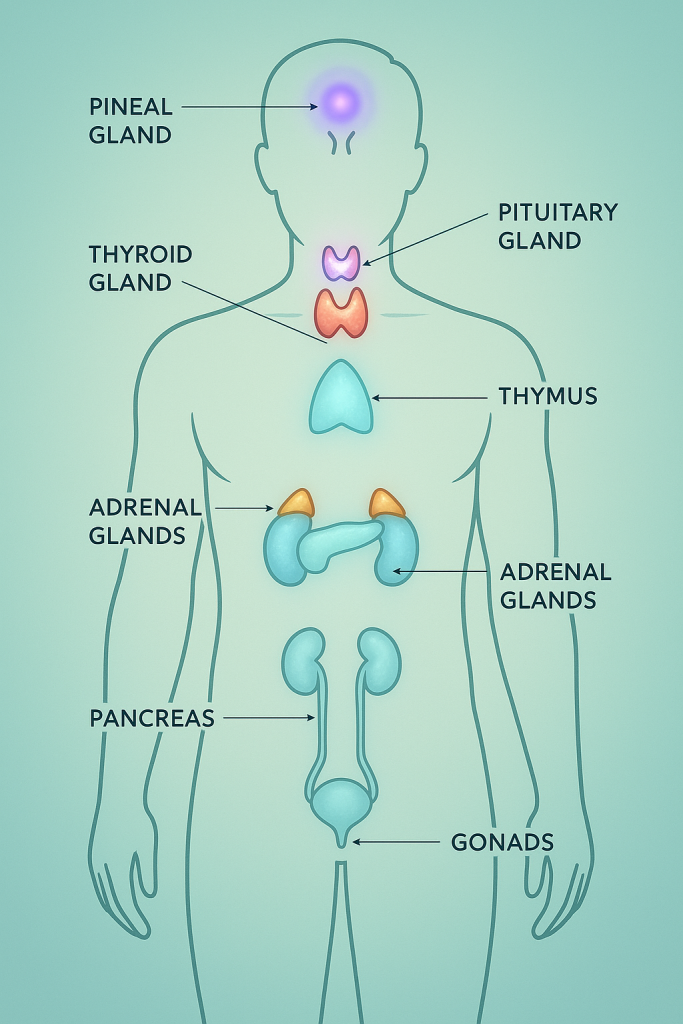The human body contains several key glands, each part of the endocrine system, which secrete hormones to regulate various physiological processes. Below is a detailed rundown of the major endocrine glands, their roles, and practical ways to support their function to improve overall health and quality of life. I’ll also touch on how these glands relate to modern-day challenges and provide actionable steps grounded in science and lifestyle adjustments.
Major Endocrine Glands and Their Roles
Pituitary Gland
Location: Base of the brain, often called the “master gland” because it controls other glands.
Role: Secretes hormones like growth hormone (GH) for growth and repair, thyroid-stimulating hormone (TSH) to regulate the thyroid, adrenocorticotropic hormone (ACTH) for adrenal function, follicle-stimulating hormone (FSH), and luteinizing hormone (LH) for reproduction. Regulates stress response, metabolism, and reproductive health.
Why It Matters: A dysfunctional pituitary can disrupt multiple systems, leading to fatigue, hormonal imbalances, or growth issues.
Thyroid Gland
Location: Front of the neck, below the Adam’s apple.
Role: Produces thyroxine (T4) and triiodothyronine (T3) to regulate metabolism, body temperature, heart rate, and energy levels. Also produces calcitonin, which helps regulate calcium levels in bones and blood.
Why It Matters: Thyroid issues (e.g., hypothyroidism or hyperthyroidism) can cause weight gain/loss, fatigue, mood swings, or temperature sensitivity, all of which impact daily productivity.
Parathyroid Glands
Location: Four tiny glands behind the thyroid.
Role: Secrete parathyroid hormone (PTH) to regulate calcium and phosphorus levels in blood and bones. Essential for bone health, muscle function, and nerve signaling.
Why It Matters: Imbalances can lead to brittle bones (osteoporosis) or muscle cramps, affecting mobility and physical resilience.
Adrenal Glands
Location: On top of each kidney.
Role: Adrenal cortex produces cortisol (stress response, metabolism), aldosterone (blood pressure, electrolyte balance), and small amounts of sex hormones. Adrenal medulla produces adrenaline and noradrenaline for fight-or-flight responses.
Why It Matters: Chronic stress in modern life can overwork the adrenals, leading to burnout, anxiety, or blood pressure issues.
Pancreas
Location: Behind the stomach.
Role: Secretes insulin and glucagon to regulate blood sugar levels. Also produces digestive enzymes for breaking down carbs, proteins, and fats.
Why It Matters: Poor pancreatic function can lead to diabetes or digestive issues, both increasingly common due to modern diets high in processed foods.
Pineal Gland
Location: Center of the brain.
Role: Produces melatonin to regulate sleep-wake cycles (circadian rhythm).
Why It Matters: Disrupted melatonin production from screen time or irregular schedules can cause insomnia or poor recovery, critical in our 24/7 world.
Gonads (Testes in males, Ovaries in females)
Location: Testes in scrotum; ovaries in pelvis.
Role: Testes produce testosterone for male development, muscle growth, and libido. Ovaries produce estrogen and progesterone for female development, menstrual cycles, and pregnancy.
Why It Matters: Hormonal imbalances can affect mood, fertility, and physical health, often exacerbated by stress or environmental toxins.
Thymus Gland
Location: Upper chest, behind the sternum.
Role: Produces thymosin to develop T-cells, critical for immune function. Most active in childhood, shrinks after puberty.
Why It Matters: A strong immune system is vital for combating modern-day pathogens and stress-related immune suppression.
How to Improve Gland Function and Enhance Life Quality
Optimizing gland function involves supporting the endocrine system holistically through lifestyle, diet, and environmental adjustments. Below are evidence-based strategies tailored to the glands’ needs, with a focus on modern-day challenges like stress, poor diet, and sedentary habits.
1. Nutrition for Hormone Health
Why It Helps: Glands rely on specific nutrients to produce hormones and function efficiently.
Actionable Steps:
- Thyroid: Ensure adequate iodine (seaweed, fish, eggs) and selenium (Brazil nuts, tuna). Avoid excess processed foods, which may contain goitrogens (e.g., soy, cruciferous veggies in large amounts when raw).
- Adrenals: Boost vitamin C (citrus, bell peppers) and B vitamins (whole grains, meat) to support cortisol production. Limit caffeine, which can overstimulate adrenals.
- Pancreas: Eat low-glycemic foods (leafy greens, berries, legumes) to stabilize blood sugar. Include chromium-rich foods (broccoli, oats) to enhance insulin sensitivity.
- Pituitary/Pineal: Omega-3s (salmon, walnuts) support brain health, where these glands reside.
- General Tip: Prioritize whole foods over processed ones. A Mediterranean-style diet—rich in vegetables, lean proteins, and healthy fats—supports all glands. Avoid extreme calorie restriction, which can suppress hormone production.
Impact on Life: Better energy, stable mood, and improved metabolism make daily tasks easier and enhance mental clarity for work or creativity.
2. Manage Stress Effectively
Why It Helps: Chronic stress raises cortisol, which can suppress thyroid function, disrupt blood sugar, and throw off reproductive hormones.
Actionable Steps:
- Practice mindfulness or meditation (10–15 minutes daily) to lower cortisol. Apps like Headspace or simple deep-breathing exercises work.
- Try yoga or tai chi to balance the hypothalamic-pituitary-adrenal (HPA) axis, which governs stress response.
- Schedule downtime to avoid adrenal overload—modern life’s constant notifications can keep you in fight-or-flight mode.
Impact on Life: Reduced anxiety and better focus improve relationships and productivity, while balanced cortisol prevents burnout.
3. Prioritize Sleep
Why It Helps: Sleep regulates melatonin (pineal), cortisol (adrenals), and growth hormone (pituitary). Poor sleep disrupts all glands.
Actionable Steps:
- Aim for 7–9 hours of quality sleep. Stick to a consistent schedule, even on weekends.
- Limit blue light exposure from screens 1–2 hours before bed to support melatonin production. Use blue-light-blocking glasses if needed.
- Create a dark, cool bedroom environment (65–68°F or 18–20°C is ideal).
- Avoid heavy meals or alcohol close to bedtime, as they can disrupt REM sleep and blood sugar regulation.
Impact on Life: Better sleep enhances mood, cognitive performance, and physical recovery, making you more resilient to daily stress.
4. Exercise Regularly
Why It Helps: Physical activity boosts circulation, delivering nutrients to glands, and balances hormones like insulin, cortisol, and testosterone/estrogen.
Actionable Steps:
- Mix cardio (e.g., brisk walking, cycling) and strength training (e.g., bodyweight exercises, weights) for 150 minutes weekly, per WHO guidelines.
- Avoid overtraining, which can spike cortisol and stress adrenals. Include recovery days with stretching or light movement.
- High-intensity interval training (HIIT) can improve insulin sensitivity and growth hormone release in short bursts (20–30 minutes).
Impact on Life: Increased energy, better body composition, and improved mood counteract sedentary modern lifestyles and boost confidence.
5. Minimize Toxins and Environmental Stressors
Why It Helps: Endocrine-disrupting chemicals (EDCs) like BPA, phthalates, and pesticides can mimic or block hormones, affecting thyroid, gonads, and more.
Actionable Steps:
- Use glass or stainless steel for food storage instead of plastic to avoid BPA.
- Choose organic produce when possible to reduce pesticide exposure, especially for the “Dirty Dozen” (e.g., strawberries, spinach—see EWG.org).
- Filter drinking water to remove contaminants like fluoride, which may impact thyroid function in excess.
- Opt for natural personal care products to avoid parabens and phthalates.
Impact on Life: Reducing toxin load supports long-term hormonal balance, fertility, and mental clarity, countering the chemical overload of modern environments.
6. Support Immune and Reproductive Health
Why It Helps: The thymus and gonads benefit from a strong immune system and balanced sex hormones, respectively.
Actionable Steps:
- Thymus: Boost immunity with zinc (oysters, pumpkin seeds) and vitamin D (sunlight, fortified foods, or supplements if deficient—check levels with a doctor).
- Gonads: Support testosterone/estrogen with healthy fats (avocado, olive oil) and avoid excessive alcohol, which can lower testosterone or disrupt menstrual cycles.
- Practice safe sex and regular health checkups to maintain reproductive health.
Impact on Life: A robust immune system reduces sick days, while balanced sex hormones enhance libido, mood, and vitality.
7. Regular Health Checkups
Why It Helps: Early detection of gland dysfunction (e.g., thyroid nodules, adrenal fatigue, insulin resistance) prevents long-term complications.
Actionable Steps:
- Get annual blood tests for thyroid (TSH, T3, T4), blood sugar (HbA1c, fasting glucose), and vitamin D levels.
- Monitor cortisol if you suspect adrenal issues (saliva or blood tests via a doctor).
- Discuss symptoms like fatigue, weight changes, or mood swings with a healthcare provider—they may signal gland issues.
Impact on Life: Proactive monitoring catches issues early, saving time, money, and stress while keeping you functional.
Modern-Day Context and Challenges
Modern lifestyles—marked by processed diets, chronic stress, screen overuse, and environmental toxins—put extra strain on glands. For example:
- Thyroid: Hypothyroidism is rising, partly due to iodine deficiencies or autoimmune conditions like Hashimoto’s, exacerbated by stress and poor nutrition.
- Adrenals: Constant deadlines and digital overstimulation keep cortisol elevated, leading to “adrenal fatigue” symptoms (though not a formal diagnosis).
- Pancreas: Type 2 diabetes rates are climbing due to sugary diets and sedentary habits—WHO reports over 400 million cases globally.
- Pineal: Blue light from phones disrupts melatonin, with studies showing 20–30% reductions in sleep quality for heavy screen users.
By addressing these challenges with the steps above, you can optimize gland function to feel more energized, focused, and resilient.
Key Takeaway: Modern life stresses your glands, but small, science-backed changes can turn the tide.
Final Thoughts
No single gland is “most important”—they all work interdependently. The thyroid might seem critical for energy, but without a healthy pituitary to regulate it or adrenals to handle stress, the system falters. Improving gland function through diet, sleep, exercise, stress management, and toxin reduction can transform your quality of life by boosting energy, mood, and longevity. Start small—pick one or two strategies, like eating more nutrient-dense foods or setting a sleep schedule—and build from there.
If you have specific symptoms or want to dive deeper into a particular gland (e.g., thyroid, adrenals), let me know, and I can tailor advice further! What’s your next step—any gland you’re curious about optimizing?
Key Takeaways:
- Eat Smart: Nutrient-rich foods fuel your glands.
- Rest Well: Sleep and stress control keep hormones balanced.
- Stay Active: Exercise supports every gland’s function.




